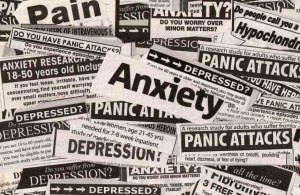
Teenagers in Egypt nowadays face a lot of problems that their parents just don’t understand. It seems like this generation, more than all of its predecessors, is exposed to a large number of problems ranging from a broken economy and non-existent job opportunities to an alarming rise in mental illness among its youth.
More and more teenagers are suffering from a wide range of mental illnesses, especially anxiety and depression, and unfortunately, society is not only failing to provide them with the support they need, but it also denies the existence of the problem itself.
“You’re too young to feel this way.” “What do you have to be sad about?” “It’s just a phase. After a while it will go away.” “Wait until you’re in the real world and then you’ll have something to be sad about.”
Those are just some of the things people, usually parents, say when a child says that they are upset. Once their worries and fears are met with responses like these, I doubt anyone would talk to their parents again, and why would they?
Mental health problems are just as serious as physical sicknesses, but they don’t get as much attention because you can’t necessarily see them. Any illness can cause damage to a person’s life, and it’s no different with mental health problems in children and young adults.
Mental health issues can lead people to self-medicate with drugs, which often only makes the problem worse. Sometimes, people feel hopeless and just stop trying; their schoolwork suffers and they shut family and friends out of their lives. They feel lonely, frustrated and angry at the world, themselves and everyone around them. In severe cases, some people hurt themselves through cutting or even by attempting suicide.
 People deny the existence of mental illness or minimize its importance for many reasons:
People deny the existence of mental illness or minimize its importance for many reasons:
They worry that if they admit that a child has a problem, then it becomes real, and although that is perfectly understandable, denying the problem doesn’t make it magically disappear, it makes it worse.
Sometimes, it’s because they are afraid of the life that their child would lead if they are in fact diagnosed or how the community or society would perceive them. However, times have changed and people who suffer from mental illness can lead successful and fulfilling lives if they receive the proper treatment, so it’s time that society’s perceptions changed as well.
Sometimes — in my opinion, the worst reason — adults feel that a child’s problem isn’t that big of a deal, that they just want attention and should toughen up. People’s feelings aren’t validated based on what you think about them. Just because you don’t feel that way doesn’t mean others don’t, and as parents, it’s not your job to tell your kids how to feel but to support your child through everything.
What can we do to help? As an adult, observe the teenagers around you and see if they show any signs of mental illness (or just see if they’re struggling in any way and could use your help). This could include:
- Mood swings (outside the range of normal teenage moodiness)
- More withdrawn than usual
- Angrier than usual
- Changes in patterns of sleep
- Excessive eating or not eating enough
- Inability to cope with everyday activities
- No energy most of the time
- Behavior problems at home or at school
- Often making self-deprecating comments
- Talking about death more frequently
The best thing you can do is talk with your child or the young person in your life. Be there for them and really listen. You never know the impact you can have on someone and just making an effort to be involved can help someone who is suffering in silence. Severe issues will require the help of a professional, so don’t be afraid to get someone else involved.
Unfortunately, this is a problem that the entire world suffers from and not just Egypt, but it’s important to remember that mental illness is nothing to be ashamed of. You wouldn’t be ashamed if you had migraines or, God forbid, cancer. These teenagers are our friends, family and could have even been us at one time or another, and it’s our duty to help them lead healthy and fulfilled lives.
WE SAID THIS: Don’t miss 10 Things I learned, Loved and Hated About Going to Therapy.


